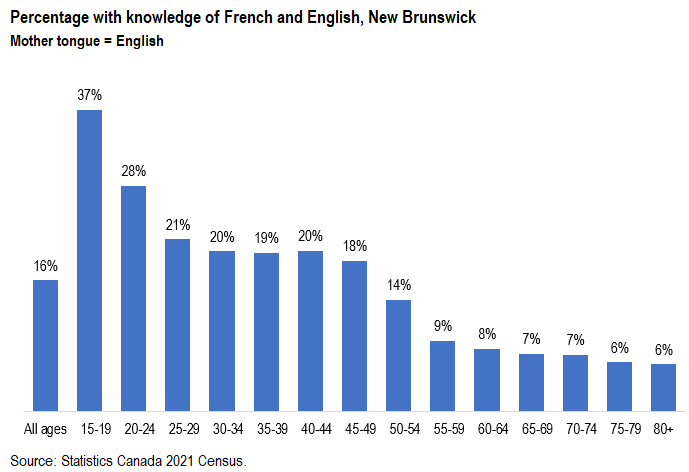The French Connection: A Hrablukian challenge
I have been asked to weigh in on the subject of French Immersion.
I am reluctant to do so in a short substack because if anything in New Brunswick fits the definition of a ‘third rail’ in New Brusnwick politics it is bilingualism.
This is what Lisa Hrabluk would call a ‘wicked’ problem.
40 years of French Immersion and only 16% of Anglophones (persons with English as their mother tongue) say they can speak French. It’s not as if the bar is high - the question on the Census is something like carry on a conversation in French.
If you look at the data going back several decades it was getting better Census period to Census period but it looks like it has stalled - hence the call to do something.
There are many reasons why this is a Hrablukian wicked problem. First, it is hard to say for sure but it looks like French Immersion graduates are more likely to migrate out of New Brunswick than non-migrants. I base this on a couple of sources but the main one being the drop off in bilingualism rates as you get into the mid-20s and early 30s. Either French Immersion graduates are changing their minds (i.e. when they were 17 they were bilingual but they lost it by 25, which for some is plausible) or they are leaving - it turns out that being bilingual is an asset outside New Brunswick, too (e.g. 28% of all Anglophones in the City of Ottawa are bilingual and it is one of the top destinations for NB migrants).
The other big challenge is that something like 60% of K-12 teachers with English as their mother tongue do not speak French (or not enough to teach in French). Someone might have a more precise number (I have to extrapolate based on Census data on knowledge of official language by industry) but it would be hard to double or triple the capacity to offer full French Immersion without hiring a ton of bilingual teachers.
But the biggest challenge is that we have never really made Anglophone bilingualism a priority outside of the K-12 classroom. I put three kids through early immersion in the cradle of immersion - Moncton - and I can state this with some certainty.
Over the years I have asked Premiers, Ministers, Deputy Ministers, Teachers, Principals, the general public, and anyone else - why there is no real attempt to have French Immersion students use French in their daily lives. They should get extra credit if they use French in their part time jobs or read in French, or use social media in French, or go to movies in French, or watch TV in French. We should send an army of French Immersion kids north every year to work in French language tourism jobs. They would have the added benefit of getting to know people in Caraquet, St. Leonard or Grand Falls. Most Anglo kids have never even visited these places.
But the even bigger problem is post-graduation. My son graduated with a very good rating in French. Then took 6 years of Engineering at UNB and never used the language once. Why not partner up UNB and UdeM so that he could have taken at least one relevant course per semester in French? Why not do this for all university and college programs?
Again, wicked problem. Anglophones would benefit from more French language education but we do very little to make that happen post high school.
The final aspect of the wicked problem is that we separate with a fairly hard wall the French and English education systems. Again, there would be merit in having French Immersion kids doing a year studying ‘in French’ - preferably in a French community but that is challenging as it can be perceived as a risk to the education of Francophone kids.
So, the Tories have decided to broaden the base of French language education but limit the depth. The idea, as I read in the paper, is that more kids will at least learn a conversational French. I think that is a risky assertion. It could turn out that even fewer Anglophone New Brunswickers learn enough French to be able to work in the language.
Again respecting the substantial challenges - real and political - I would suggest a better option would be to broaden French Immersion - even if it takes a few years - and do far more to integrate the language into the students’ daily lives and do far more to infuse it into post-secondary education.
I realize that some teachers are opposed - they worry the quality of English grammar and writing, etc. will suffer. Again, part of the wicked problem. The system needs to provide both - graduates that are very solid in English and strong in French. My three FI kids went through English language universities and didn’t seem to have much problem with their writing and grammar.
Unfortunately there is no silver bullet. There are few jurisdictions in the world attempting something that would be considered broad-based two-language K-12 programs. I remember reading about a school district in California that wanted to offer Spanish and English education and the parents of the Hispanic children voted it down resolutely because they felt their kids had to master English to survive in U.S. society.
But this must a part of fostering a bilingual society in New Brunswick.



